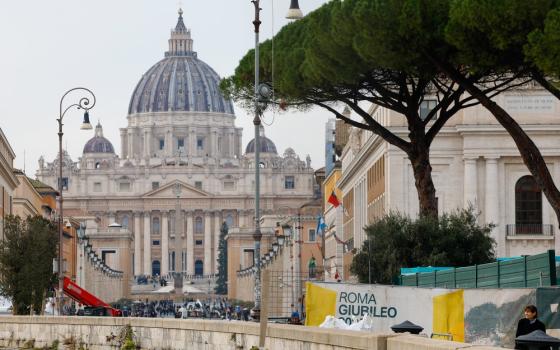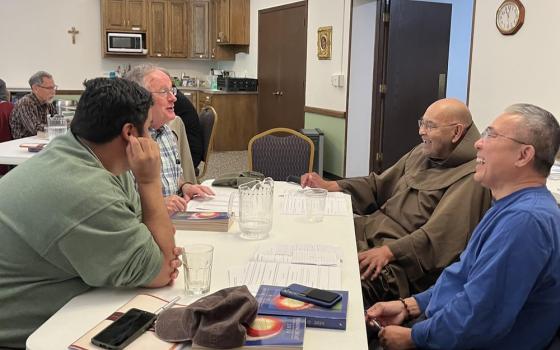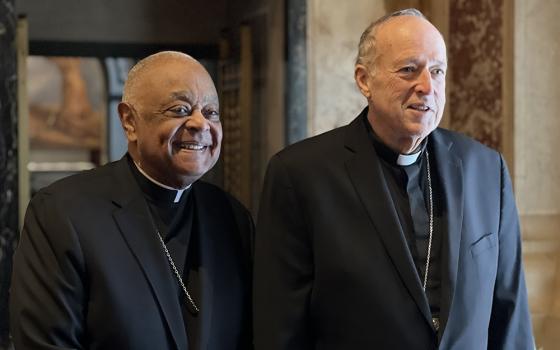Today, we commence the Triduum. Last year, I wrote essays for each of the three days and remain sufficiently pleased with them so as not to try a repeat. This year, as well, my understanding of the Triduum has been immeasurably deepened by reading the second volume of Pope Benedict’s Trilogy on Jesus of Nazareth which deals with the events of Holy Week.
Let us start right there: The events of Holy Week. Perhaps the most important thing to remember as we enter into these holy days is that the Triduum is an event. At the heart of our faith is not a theory, not a moral principle, not a theological argument. At the center of our faith is an event, the Paschal Mystery, which reveals the Triune God and invites us to share in the life and the love of the Trinity. Like all events, the event of the Paschal Mystery happens in history but it also happens beyond history, which is why we say the Triduum is an event, not was an event. At every Mass, we enter into that event. It is the on-going salvific event that reconciles the world to God.
The Triduum spans three days, with three liturgies, but it is – and must be understood, must be entered into – as a single event. You see this is in the liturgical actions: At the end of the Mass of the Lord’s Supper, there is no closing blessing, the celebrant departs in silence. Tomorrow, on Good Friday, there is no opening “In the name of the Father, and of the Son, and of the Holy Spirit.” The priest will enter in silence, prostrate himself before the altar, then stand and give the opening prayer. The Great Easter Vigil opens with the procession of the Paschal candle and the Exsultet. This lack of the usual opening and closing rituals demonstrates that the Triduum is one prayer, a prayer that does not end.
What does this feature of the liturgy teach us? One of my many pet peeves is when a preacher proclaims “We are an Easter people.” It is true, of course, we are an Easter people but we only get to Easter through Good Friday. And the significance of both Good Friday and Easter is set out for us in the Mass of the Lord’s Supper on Holy Thursday. I think that any over-emphasis of one over the other results in a distorted Christian spirituality. The “we are an Easter people” sermons elide the suffering and death of Christ, and the suffering and death that awaits us all. On the other hand, the “we stand in the shadow of the Cross” folks tend to turn into prophets of doom, forgetting that the Cross does lead to the empty tomb. There is hope in the Cross, indeed, the only hope worthy of the name is born of the Cross, not a mere optimism, but genuine hope. Nor is any hope worthy of the name a hope that cannot face up to the sufferings and sins of life. This is not only an event, it is one event.
Of all the many passages in Benedict’s book, his section on the Washing of the Feet, which may be optional according to the rubrics but is hardly optional when understanding the significance of the Triduum, is my favorite part of the whole book. He notes that the Great Commandment to love one another is both sacramentum and exemplum, and that the two are linked in a mutual relationship. It is not a particular sacrament, but instead points to “the entire mystery of Christ.” He writes: “But precisely because this sacramentum truly ‘cleanses’ us, renewing us from within, it also unleashes a dynamic of new life. The command to do as Jesus did is no mere moral appendix to the mystery, let alone an antithesis to it. It follows from the inner dynamic of gift with which the Lord renews us and draws us into what is his.”
If any theme has been a constant at this blog, it has been that the reduction of religion to ethics is one of the most nefarious, and un-Catholic, consequences of our modern conception of the relationship of faith and culture. You find it on the right and you find it on the left. But, you surely do not find it in the pope emeritus’ treatment of the Great Commandment. He writes, and I quote at length because these three paragraphs are so beautiful they deserve to be quoted in full:
It has been argued that the new element – moving beyond the earlier commandment to love one’s neighbor – is revealed in the saying “love as I have loved you,” in other words, loving to the point of readiness to lay down one’s life for the other. If this were the specific and exclusive content of the “new commandment,” then Christianity could after all be defined as a form of extreme moral effort. This is how many commentators explain the Sermon on the Mount: in contrast to the old ways of the Ten Commandments – the way of the average man one might say – Christianity, through the Sermon on the Mount, opens up the high way that is radical in its demands, revealing a new level of humanity to which men can aspire.
And yet who could possibly claim to have risen above the “average” way of the Ten Commandments, to have left them behind as self-evident, so to speak, and now to walk along the exalted paths of the “new law”? No, the newness of the new commandment cannot consist in the highest moral attainment. Here, too, the essential point is not the call to supreme achievement, but the new foundation of being that is given to us. The newness can come only from the gift of being-with and being-in Christ.
Saint Augustine actually began his exegesis of the Sermon on the Mount – his first cycle of homilies after priestly ordination – with the idea of a higher ethos, loftier and purer norms. But in the course of the homilies, the center of gravity shifts more and more. In a number of places he has to acknowledge that the older morality was already marked by a genuine completeness. With increasing clarity, preparation of the heart comes to replace the idea of the higher demand (cf. De Serm. Dom. In Monte I, 19, 59); the “pure heart” (cf. Mt 5:8) becomes more and more the focus of the exegesis. Over half of the entire cycle of homilies is shaped in terms of this basic idea of the purified heart. Hence the connection with the washing of the feet becomes visible in a surprising way: only by letting ourselves be repeatedly cleansed, “made pure,” by the Lord himself can we learn to act as he did, in union with him.
I am glad to know that this desire to reduce religion to ethics afflicted Augustine, that it is not merely a modern development, but I do wonder if we have the intellectual and spiritual perseverance that Augustine had. It is all too easy to stop with a higher morality, so much easier to feel good about ourselves if we are chaste or doing good works, so tempting to think that we might earn our way, that we might not have to say, as say we do, “Lord I am not worthy….” This is the great heresy of Pelagianiam and it is with us still.
It is my fervent prayer that these three days will serve to shake all of us out of our preconceived ideas, our comfortable ideological approaches, our efforts to be better and more moral, and remind us that when the divine and human wills of Jesus Christ are most obviously in tension these three days, we rightly call that moment the Agony in the Garden. In the Garden of modernity, we do not have much appreciation for agony. The Cross of Christ is a scandal today in a different way from what it was two thousand years ago: They could not see how a God could be crucified and we, arriving at the same conclusion by a different route, see the Cross as a sign of propriety. We wonder if the tomb was really empty, and our exegetes ponder the issue, as if the claims to see the Risen Lord might not have been easily disproved if the tomb had been occupied. The Paschal Mystery replaces the cult of the Temple with a new cult, the Temple of Jesus’ body being the focus of our worship, and yet we try and erect our own Temples and worship there, the Temple of moral, usually sexual, purity, the Temple of social justice, the Temple of liturgical precision. To be sure, I am all in favor of moral and sexual purity, and I am committed to social justice, and I love a well done liturgy, but these three days remind us that these various carts must follow the Triduum’s horse, not the other way round. Like the catechumens, we must be baptized into the death and resurrection of Jesus Christ and come out of that water changed, purified, and just so capable of living morally, and justly, and prayerfully. The temptation of our age is to ask “What about me?” The answer, for the Christian, is found in this Triduum: “It is not about you, it is about Him, or, better to say, it is now about you because of Him.” Was that not what Pope Benedict, in his way, was trying to say to us these past eight years? Is it not what Pope Francis is trying to say to us now?
Pope Benedict's extraordinary book has helped me focus this year, focus on contemplating the self-surrender of Jesus to the will of the Father, the glorification of the Crucified who is Risen, and the fellowship of the Holy Spirit made manifest at the table of the Last Supper. This is what it is all about. This is what changes the world, these three days. Tomorrow, on Good Friday, the deacon will chant "This is the wood of the Cross, on which hung the Savior of the world." We the people will respond "Come, let us worship." Indeed. Come, let us worship. I wish you and all those whom you love a blessed and holy Triduum.



